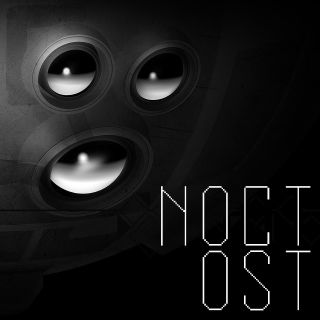You’re hurrying through a monochrome world, seen from above in the grainy, blown-out greys of a satellite image. Out there in the darkness, there are things hunting you. You encounter another figure, a fellow Survivor; but can they be trusted? Or will they stab you in the back and leave you at the mercy of the wasteland’s creatures?
This is the world of Noct, a new video game from Devolver Digital – and it’s set to the chilly, melodic tones of musicians Wordclock and Robin Finck.
Robin Finck, of course, is the Nine Inch Nails guitarist who brings Trent Reznor’s compositions to life on stage and in the studio. He’s the guy who took over from Slash in Guns N’ Roses, after being spotted by Axl playing with Cirque du Soleil (then he left, then came back, then left again; the comings and goings in Axl Rose’s band are the stuff of legend). He’s played Led Zeppelin with acrobats, and he has a trapeze in his backyard. So it’s perhaps unsurprising that his involvement with Noct came about in unconventional fashion – thanks to a chance meeting at the Burning Man festival. “I’ve a friend called Mike Wilson, met him on the Playa,” he explains. “He’s in Austin and I’m in California, but we kept in touch through the years and recently, finally, got to talking about applying my sensibilities to game scores for Devolver Digital projects. Devolver Digital, he’s with them, you see.”
With its lo-fi black-and-white design and horror gameplay, Noct was a natural fit with the NIN guitarist’s sensibilities. “The first time I saw the build for Noct, I was immediately taken by the clean, stark monochrome of the terrain; I knew it would be a fitting team and a perfect toe-in for me to be involved with such a thing.”
Finck collaborated throughout the process with composer Wordclock, aka Pedro Pimentel. “He lives in Portugal. I feel like he lives in my computer,” Finck says. “Pedro and I hooked up on Skype every week, or every hour-toward the end, and discussed ideas, progress, options. We threw everything back and forth on Dropbox. It was pretty cool. I still don’t know what Pedro looks like. But I’ve seen his naked tracks and my regions are all over his DAW [digital audio workstation].”

“Pedro had laid a foundation for Noct that was functional and working really well,” Finck explains. “I was invited to the team to help bolster a more dynamic score, but also to consider a more far reaching soundtrack,” he explains. “In the end, we each passed around the hats, creating a wealth of new material.”
The score itself blends moody synth ambience with Finck’s fuzzy, melodic guitar – instantly familiar if you’ve heard his contributions to NIN and Chinese Democracy (that tortured, emotive solo on Axl’s piano ballad This I Love is Finck’s work). The overall effect is surprisingly upbeat, in places, considering the game’s post-apocalyptic setting – adding what Finck calls a “a wistful sense of hope – albeit illusory.”
“We knew we wanted the score to establish a state of suspended immersion,” says Finck, “Don’t ask me what that means right now, but that’s what we kept talking about. I think it makes sense when you play the game. The score kinda lies somewhere between the player and the Survivor. It’s a bit queer like that. Intentionally. We like how the tracks sometimes oppose the barren scene, filling it with a fleeting glimpse of something possible, but not actual.”
“I sound like a crazy person,” he jokes. “But that’s where you gotta go, to get into this stuff.”
A video game score is a very different beast from a conventional album, or a film soundtrack (Finck contributed some solos to John Carpenter’s Ghosts of Mars soundtrack alongside Steve Vai, Anthrax and fellow GN’R alumnus Buckethead). “They generally have singers or soloists and completely different song structures, and live performances to consider, and all that,” notes Finck. A game soundtrack, by contrast, has to match the mood regardless of what the player’s doing; you can’t assume that it’s going to match the on-screen action exactly, in the same way that a film score does. “The game score is a giant loop with crossfades between tracks,” Finck explains. “It goes until the game state changes – at which point, you’re usually about to get dead. When you select a new Survivor, the scene drops you randomly into the loop again.” Key changes and percussion were no-nos – because of the random selection element, anything that could detract from the game scenes or establish too “weighty” a mood was out.
Noct is available to download from October 22nd; and if you don’t feel like being terrorised by giant spiders in a post-apocalyptic nightmare landscape, the soundtrack is also being made available to buy separately. As for Robin Finck, he’s keen to explore the gaming world further: “I’m moving forward one yes at a time.”


